
Linalool is an aromatic compound responsible for the floral, lavender-like scent in many cannabis strains and other plants. Beyond its pleasant smell, linalool shapes the effects of cannabis, enhancing its potential for relaxation, stress relief, and pain management.
Linalool isn't confined to just one type of cannabis strain. You can find it in sativas, indicas, and hybrid weed. Hybrid cannabis strains often offer a more balanced experience, combining the best traits of both sativa and indica varieties.
Our low-dose THC gummies deliver a perfectly balanced experience that helps you find your calm and cool.
What is linalool?
Linalool is a naturally occurring terpene found in more than 200 plants. Its chemical formula is C10H18O, and it belongs to the class of monoterpenes. This colorless to pale yellow liquid has a distinctive floral aroma, often described as similar to lavender, bergamot, or sweet wood.
Linalool is one of the more common terpenes in the cannabis plant, but it’s also found in:
- Lavender
- Coriander
- Basil
- Mint
- Cinnamon
- Rosewood
- Birch trees
- Sweet orange
- Jasmine
- Lemongrass
Like other terpenes, linalool is a volatile compound. It readily evaporates at room temperature and has a low boiling point. This volatility is crucial for linalool's roles in nature, such as attracting pollinators and repelling pests, and also contributes to its uses in aromatherapy, fragrances, and the characteristic scent of cannabis strains.
What does linalool taste like?
Linalool has a complex flavor profile that is often described as floral and sweet. Its taste is typically characterized as light and reminiscent of lavender, with subtle citrusy and spicy notes.
In cannabis, linalool's flavor interacts with other terpenes and cannabinoids to contribute to the strain's unique taste profile. While it may not dominate the flavor, it adds depth and complexity, enhancing the overall sensory experience. Strains high in linalool often have a softer, more floral taste that balances out harsher or more pungent flavors from other compounds.
What does linalool smell like?
The scent of linalool is most commonly compared to lavender, which is one of the plants known for its high linalool content. Many people also detect notes of bergamot, giving it a slightly citrusy undertone. Its additional descriptors include sweet wood, spicy, and even a hint of mint.
This distinctive aroma is why linalool is prized in the perfume industry and contributes significantly to the complex scent profiles of many cannabis strains.
How does linalool make you feel?
Linalool has calming properties, soothing both your mind and your body. Individual experiences differ, but linalool is generally associated with positive effects on mood and overall well-being. Here’s how this aromatic compound can make you feel:
- The floral, lavender-like aroma of linalool is often described as pleasant and soothing.
- Linalool is known for its calming effects. It makes users feel more at ease and less tense. Many people report feeling less stressed after exposure to linalool, whether through aromatherapy or cannabis use.
- Users experience a gentle uplift in mood, feeling more positive and content.
- In higher concentrations, linalool can have sedative effects, making users feel sleepy or drowsy.
- Because of its analgesic properties, linalool makes you feel less physical discomfort.
- Many find that linalool helps them fall asleep more easily and enjoy better quality sleep.
Linalool is a staple terpene in many hybrid strains. Here at nama™, we don’t bother with specific strains. Our hybrid products deliver balanced, effective experiences in the most delicious way possible. Order our Euphoria gummies and choose from several flavor profiles to tantalize your taste buds. With only 10 mg of THC and 10 mg of CBD, these hybrid edibles make you feel at ease without the overwhelming side effects.
Learn more about microdosing cannabis and why our low-dose edibles are the future of cannabis consumption.
What is linalool used for?
Linalool has many uses across different industries and applications.
- Fragrance industry: linalool is used for its pleasant floral aroma in perfumes, cosmetics, and personal care products.
- Aromatherapy: it's commonly used in essential oils and aromatherapy practices for its potential relaxing and stress-relieving properties.
- Flavor enhancer: linalool adds subtle floral notes to the taste profile of food and beverage products.
- Insect repellent: in nature, linalool acts as a natural pesticide, defending plants against harmful insects and pests.
- Pollinator attraction: in plants, linalool's scent helps attract beneficial insects for pollination.
- Cleaning products: linalool is used in many household cleaning products for its pleasant scent.
- Cannabis industry: linalool contributes to the plant's aroma profile and may enhance its potential medicinal properties.
Cannabis strains with higher levels of linalool are favorites among cannabis enthusiasts because of their potential benefits and therapeutic effects.
Benefits of linalool
Linalool offers a wide range of potential benefits for both mind and body. Its therapeutic effects are amplified when linalool works in concert with other cannabis compounds, a phenomenon known as the entourage effect. This synergy between terpenes like linalool and cannabinoids such as THC and CBD enhances the overall therapeutic potential of cannabis, providing more comprehensive and effective relief than isolated compounds alone.
Let's explore the impressive array of potential benefits that linalool may offer.
- Anxiety relief and stress reduction: many people find that linalool quiets those racing thoughts and nervous feelings, promoting a sense of calm. Korean researchers found that linalool improved memory and reduced stress in sleep-deprived mice, likely by increasing serotonin levels and reducing cortisol. These effects on stress hormones and neurotransmitters suggest that linalool could have anxiety-reducing properties.
- Sleep aid: if you're tossing and turning at night, linalool might help. It can make you feel drowsy and improve overall sleep quality. A 2021 pilot study suggests that inhaling lavender aroma, which contains linalool, can quickly improve sleep quality and brain activity. Aromatherapy with lavender essential oil (containing linalool) showed immediate benefits for sleep and daytime vigor after just one night of exposure.
- Pain management: linalool may dull pain signals. Research shows that linalool reduces pain sensitivity in mice with nerve injuries. In experiments where mice had a specific nerve tied off to mimic chronic pain conditions, linalool decreased their sensitivity to touch, suggesting it could have pain-relieving properties.
- Anti-inflammatory effects: A 2015 study shows that linalool can reduce inflammation in brain cells. It seems to work by activating specific protective mechanisms in the cells, which then decreases the production of inflammatory substances when the cells are exposed to harmful stimuli. By reducing inflammation in the body, linalool helps with conditions ranging from skin irritation to internal swelling.
- Neuroprotective potential: Yuan, et. al. suggest that linalool might protect brain cells from damage caused by amyloid beta, a protein associated with Alzheimer's disease. It does this primarily by reducing oxidative stress and inflammation in the brain.
- Mood enhancement: many users report feeling more positive and content after exposure to linalool, pointing to its potent mood-lifting properties.
- Antimicrobial properties: according to a 2022 study, linalool shows promising antifungal activity against Candida albicans, a common cause of yeast infections. It works by damaging the cell wall and membrane of the fungus, possibly by interacting with enzymes involved in their structure. Linalool might be safe for oral use and has low toxicity, making it a potentially valuable natural antifungal agent.
You can rely on our entourage effect gummies to bring together the perfect blend of cannabinoids for a balanced, soothing experience. Try our Energy Delta 9 gummies with 2.5 mg of THC and 5 mg of CBD to experience a perfectly balanced, soothing effect that showcases linalool's calming and uplifting properties.
Product QUIZ
Need help deciding what product is best for you? Take our quiz, just three questions until your perfect match!
Is linalool toxic?
Linalool is considered safe for most people when used in moderate amounts. The FDA's GRAS (Generally Recognized as Safe) designation for linalool means it's considered safe for use in food products based on extensive scientific evidence.
Like many other substances, linalool can cause side effects or toxicity at extremely high levels of exposure. These situations are rare and usually only occur in industrial settings or with intentional misuse. Possible effects of excessive exposure might include:
- Skin irritation or allergic reactions
- Respiratory irritation
- Potential liver toxicity at very high doses
The amounts of linalool encountered in everyday products or cannabis use are far below levels that could cause toxicity. As with any substance, moderation is key.
What cannabis strains are high in linalool?
Linalool tends to be more prevalent in strains that have a floral or lavender-like aroma, regardless of their classification as indica or sativa.
Here's a list of 10 cannabis strains known for their high linalool content:
- Lavender has a strong lavender aroma and relaxing, anxiety-reducing effects.
- LA Confidential is an indica-dominant strain that offers deep relaxation and stress relief. Many cannabis users turn to this strain for insomnia.
- Amnesia Haze has energizing sativa effects, but also a notable linalool content. Amnesia Haze provides a balanced, uplifting experience.
- Do-Si-Dos is a potent strain that combines relaxation with euphoria, making it popular for both recreational and medicinal use.
- Zkittlez packs a fruity flavor profile and a significant amount of linalool, which contributes to its stress-relieving properties.
- Purple Kush is a classic indica strain with a grape-like aroma. It offers deep relaxation and potential pain relief.
- Scooby Snacks is a hybrid strain that provides a well-balanced high with prominent anxiety-reducing effects.
- Kosher Kush is an award-winning strain known for its strong sedative effects, perfect for nighttime use.
- Pink Kush is an indica-dominant strain with potential to offer relaxation and pain management.
- OG Shark is another hybrid that combines relaxation with mental clarity, making it versatile for different times of day.
With nama™, you don't have to choose between strains. Our products combine the best of both worlds, offering balanced ratios of cannabinoids and terpenes from hybrid varieties. This means you get a well-rounded experience that captures the full potential of cannabis, without having to worry about selecting the perfect strain every time.
Find your perfect moment of calm with our Relax Plus gummies, thoughtfully crafted to help you unwind. Each gummy showcases a harmonious blend of 5 mg THC and 25 mg CBD to bring out the best of cannabis's natural compounds.
“Like the affects this has on me. I can take it to relax, but still be able to concentrate and so things without feeling buzzed.”
Order hybrid edibles for a perfectly balanced experience
Looking for hybrid cannabis products rich in beneficial terpenes like linalool? Look no further than nama™. We specialize in premium cannabis edibles that deliver a wide range of benefits through our carefully crafted formulations. Our cannabis gummies and THC-infused drinks offer the perfect balance of effects for a soothing and relaxing experience.
We've crafted unique recipes that promote relaxation and peace of mind. Our products use only the highest-quality, hemp-derived extracts, ensuring a consistent and effective experience every time. Whether you're seeking stress relief or better sleep, our hybrid-rich formulations help you unwind and find balance.
Our gummies are delicious and the perfect on-the-go way to enjoy the benefits of cannabis, but if you want to indulge yourself in a chill cannabis experience, infuse your favorite drinks with our low-dose Buzz Drops™. They contain only 2.5mg of THC per dropper, balanced out by the same amount of soothing CBD to create a gentle, relaxing experience.
Learn how to craft the best THC mocktails and reap the beneficial effects of microdosing cannabis.
Don’t worry—all our edibles are federally legal in the U.S, so order today.
Linalool cannabis terpene FAQ
What is the difference between limonene and linalool?
Limonene and linalool are both terpenes found in cannabis and other plants, but they have distinct properties. Limonene has a citrusy aroma reminiscent of lemons and oranges, while linalool has a floral fragrance profile similar to lavender. Both offer potential health benefits, but their effects differ.
Linalool is known for its calming and sedative properties, potentially aiding in stress relief and sleep.
Limonene is often associated with mood elevation and potential antidepressant effects. In cannabis cultivars, these terpenes contribute to the unique fragrance profiles and may influence the overall experience through the entourage effect.
What are the side effects of linalool?
Linalool is generally recognized as safe (GRAS) by the FDA and is widely used in commercial products. Some people may experience mild side effects.
- In skincare products, it might cause skin irritation in sensitive individuals.
- When inhaled in very high concentrations, such as in aromatherapy, it could potentially cause respiratory irritation.
- In extremely high doses, far beyond what's typically found in cannabis or essential oils, animal studies have suggested it could cause sedation or temporary cognitive impairment.
Most people using linalool in normal amounts, whether through cannabis, essential oils, or other products, are unlikely to experience significant adverse effects. As always, start with low doses and consult a healthcare provider if you have concerns.
Can linalool get you high?
Linalool itself doesn't cause a "high" like THC does. It's a non-intoxicating organic compound that doesn't directly affect consciousness in the way that major cannabinoids might. It may contribute to the overall relaxing effects of certain cannabis strains. When combined with THC in whole-plant cannabis products, it might enhance the calming aspects of the high without directly causing intoxication.
Should I avoid linalool?
Most people don't need to avoid linalool. It's widely used in household products, skincare, and aromatherapy because of its pleasant scent and potential benefits. It's found naturally in many plants, including lavender, coriander, and some cannabis strains.
If you have known allergies to lavender or similar plants, you might want to be cautious. In rare cases, some people might be sensitive to linalool and experience skin irritation or allergic reactions. If you're using cannabis for medical purposes, always consult an experienced caretaker or healthcare provider about the best strains and terpene profiles for your needs.
Is linalool sedating?
Linalool can have sedating properties. Preclinical studies and some human studies have shown it may reduce anxiety, lower heart rate, and promote better sleep. In a rat model of myocardial infarction, linalool dose-dependently decreased the incidence of arrhythmias. This is why many people find lavender (which is high in linalool) helpful for relaxation.
In cannabis strains, linalool may contribute to the calming effects of indica varieties. Its potential to interact with GABA receptors and influence serotonin pathways might explain its sedative effects. The intensity of these effects varies based on the concentration of linalool and its interaction with other compounds in a given product. For those seeking a calming experience from cannabis, strains rich in linalool like Lavender Kush or Amnesia Haze might be worth exploring.
Resources
Lee, B. K., Jung, A. N., & Jung, S. (2018). Linalool Ameliorates Memory Loss and Behavioral Impairment Induced by REM-Sleep Deprivation through the Serotonergic Pathway. Biomolecules & Therapeutics, 26(4), 368-373. https://doi.org/10.4062/biomolther.2018.081
Ko, L., Su, C., Yang, M., Liu, S., & Su, T. (2021). A pilot study on essential oil aroma stimulation for enhancing slow-wave EEG in sleeping brain. Scientific Reports, 11(1), 1-11. https://doi.org/10.1038/s41598-020-80171-x
Berliocchi, L., Russo, R., Levato, A., Fratto, V., Bagetta, G., Sakurada, S., Sakurada, T., Mercuri, N. B., & Corasaniti, M. T. (2008). Chapter 17 (–)‐Linalool Attenuates Allodynia in Neuropathic Pain Induced by Spinal Nerve Ligation in C57/Bl6 Mice. International Review of Neurobiology, 85, 221-235. https://doi.org/10.1016/S0074-7742(09)85017-4
Li, Y., Lv, O., Zhou, F., Li, Q., Wu, Z., & Zheng, Y. (2015b). Linalool Inhibits LPS-Induced Inflammation in BV2 Microglia Cells by Activating Nrf2. Neurochemical Research, 40(7), 1520–1525. https://doi.org/10.1007/s11064-015-1629-7
Yuan, C., Shin, M., Park, Y., Choi, B., Jang, S., Lim, C., Yun, H. S., Lee, S., Won, Y., & Cho, K. S. (2021). Linalool Alleviates Aβ42-Induced Neurodegeneration via Suppressing ROS Production and Inflammation in Fly and Rat Models of Alzheimer's Disease. Oxidative Medicine and Cellular Longevity, 2021. https://doi.org/10.1155/2021/8887716
Medeiros, I. S., Filho, G. A., Freitas, O. R., Uchoa, P. L., Nobre, S. C., Bezerra, L. D., Rolim, M. M., Morais, M. B., Nogueira, S. S., Nogueira, S. S., Filho, A. O., & Lima, E. O. (2022). Antifungal activity of linalool against fluconazole-resistant
clinical strains of vulvovaginal Candida albicans and its
predictive mechanism of action. Brazilian Journal of Medical and Biological Research, 55. https://doi.org/10.1590/1414-431X2022e11831
nama CBD FDA & legal disclaimer
Our products are not intended to diagnose, treat, cure, or prevent any disease. They are not a replacement for prescription medications and have not been evaluated by the U.S. Food and Drug Administration (FDA).
The information provided on this website does not and is not intended to, constitute legal advice or any statement of the status of any laws. Any information, content, and materials available on this site are for general informational purposes only and are not intended to be relied upon for any purpose.
Readers of this website should contact their attorney to obtain advice with respect to any particular legal matter, including decisions on what products are, or are not, legal to sell, possess, or consume. No reader, user, or browser of this site should act or refrain from acting on the basis of the information on this site without first seeking legal advice from their own counsel in the relevant jurisdiction.
Further reading
Are hybrids uppers or downers?
Our THC gummies that give you energy
How does the hybrid weed trigger the entourage effect?
Indica vs sativa vs hybrid: what you need to know
More articles
About
Learn
Join us on this journey

© Copyright 2025 nama Products LLC. All Rights Reserved.
†These statements have not been evaluated by the Food and Drug Administration. These products are not intended to diagnose, treat, cure or prevent any disease. All information presented here is not meant as a substitute for or alternative to information from health care practitioners. Please consult your health care professional about potential interactions or other possible complications before using any product.
††The information provided on this website does not, and is not intended to, constitute legal advice or any statements of the status of any laws. Any information, content, and materials available on this site are for general entertainment purposes only, and are not intended to be relied upon for any purpose.
123 John Doe Street
Your Town, YT 12345
Store Hours
Sun: Closed
Mon-Fri: 9:00 - 17:00
Sat: 10:00 - 13:00
What to expect at pickup
Closed
Closing at 5pm
Closing at 5pm
Closing at 5pm
Closing at 5pm
Closing at 5pm
Closing at 1pm

![Buzz Packs™ [THC and CBD Powder Drink Mix]](http://www.namacbd.com/cdn/shop/files/nama_buzz_packs_thc_drink_pack_white_background.png?v=1741884660&width=480)
![Buzz Packs™ [THC and CBD Powder Drink Mix]](http://www.namacbd.com/cdn/shop/files/Buzz_Packs_Label.png?v=1741884660&width=480)


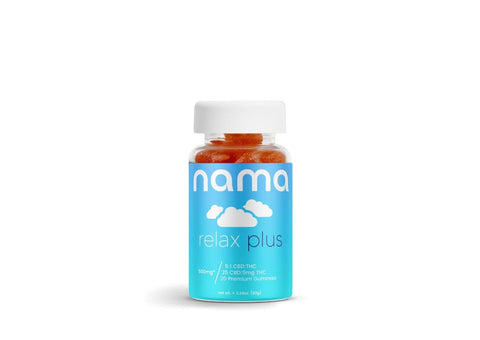
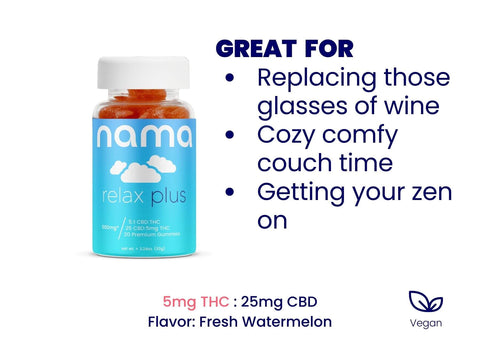
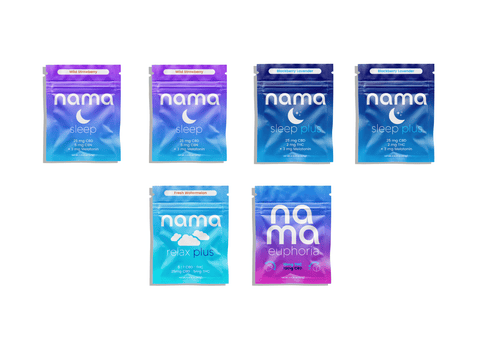

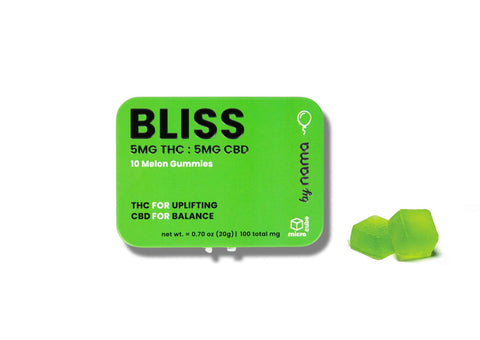
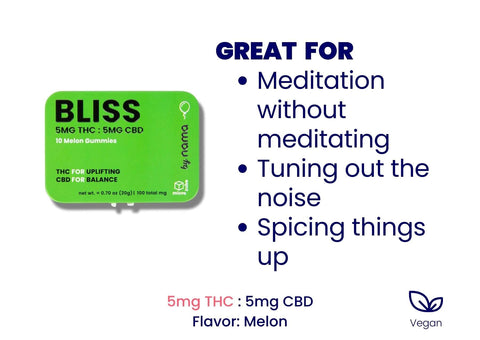
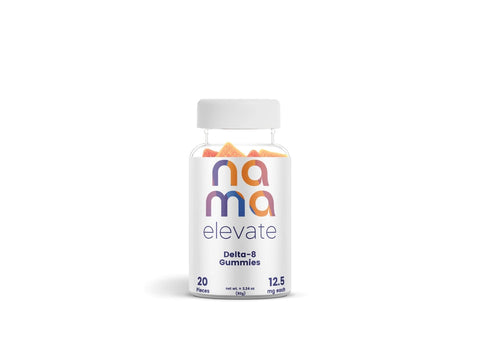
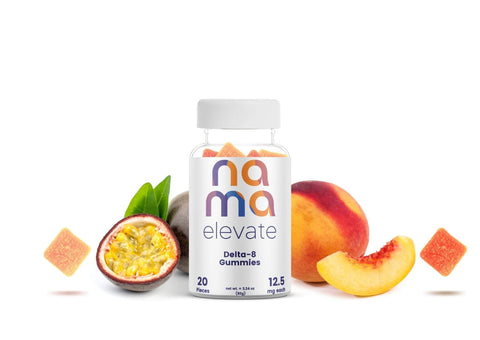
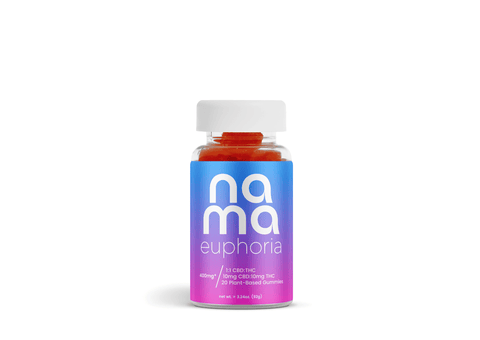
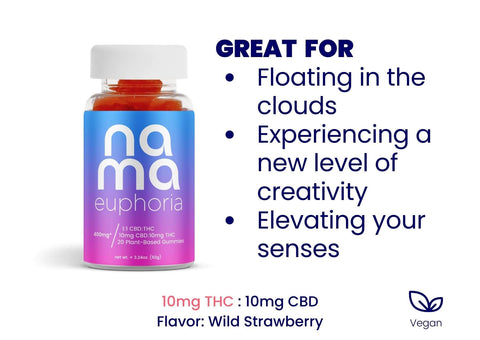
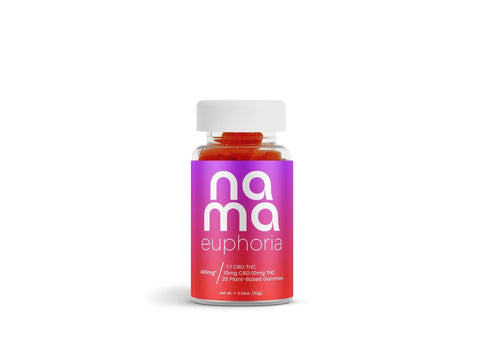
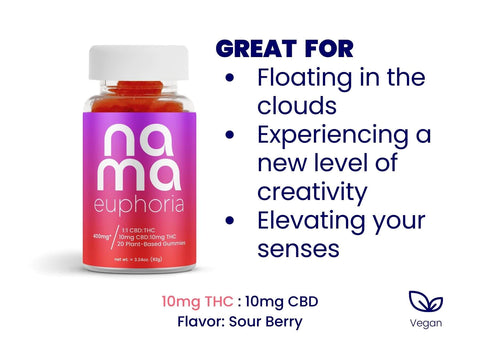









![Buzz Drops™ [THC Drink Drops]](http://www.namacbd.com/cdn/shop/files/nama_thc_buzz_drops.png?v=1711412866&width=480)
![Buzz Drops™ [THC Drink Drops]](http://www.namacbd.com/cdn/shop/files/buzz-drop-wine-comparison.png?v=1736882023&width=480)



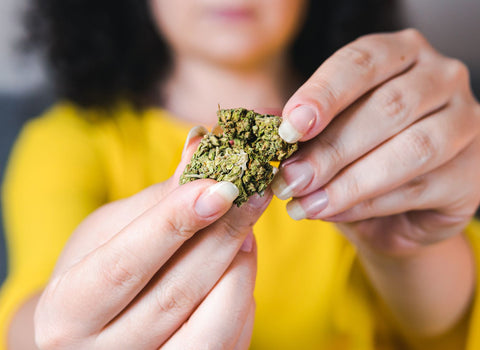


Comments (0)
There are no comments for this article. Be the first one to leave a message!